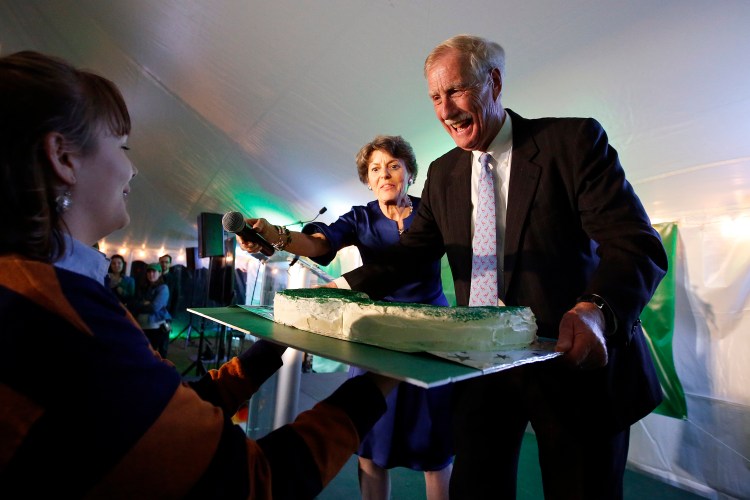BRUNSWICK – U.S. Sen. Angus King easily beat back his Republican and Democratic challengers Tuesday night to earn a second six-year term.
King, an independent, declared victory around 11:30 p.m., although his closest competitor, Republican Eric Brakey didn’t concede until Wednesday morning.
With 76 percent of Maine precincts reporting, King had 55 percent of the vote, which put him ahead of both Brakey, with 35 percent, and Democrat Zak Ringelstein, with 11 percent.
“I’ve never been involved in a campaign where people worked so hard for so long,” King told a group of supporters who had gathered at Flight Deck Brewing in Brunswick, the town where he has lived for decades. “Everywhere in the state, (we saw) really positive results and it’s humbling.”
The mood at King’s campaign event was jubilant from the time polls closed and only grew as results trickled in. When he took the stage shortly after 11:30 to declare victory, several family members, including his wife, Mary Herman, joined him on stage. He thanked them one by one and then shared a story from the campaign about a Mainer he encountered who said King was the only politician he trusted.
“My whole goal is to continue to earn that trust,” he said. “That’s what this is all about. I hope the people of Maine can always feel that way.”
Ringelstein called King to concede Tuesday night but Brakey waited until Wednesday.
“I want to thank the Maine people who cast their votes for my candidacy during this race for US Senate and everyone who committed their personal time, energy and resources to our cause,” he said in a statement. “Sadly, it was not enough.”
Brakey said he planned to call King on Wednesday to congratulate him.
“And I will also take the opportunity to speak with him about several issues I believe are important for our liberties,” he added.
King, 74, was first elected to the Senate in 2012, handily defeating his challengers, Republican Charlie Summers and Democrat Cynthia Dill. He filled the Senate seat that had been held for three terms by Olympia Snowe, a Republican.
King, who served as Maine’s governor from 1995 through 2003, is an independent but caucuses and regularly votes with Democrats in Congress.
Prior to election night, Republicans held a narrow majority in the Senate and were projected to retain that majority, albeit narrowly.
During the campaign, King weathered criticism from the right and the left.
Brakey, 30, a two-term state senator from Auburn, frequently cast King as a big spender and a flip-flopper.
Ringelstein, 32, a Democratic socialist and former teacher from Yarmouth, often hit King for his campaign contributions from various corporate interests.
In one memorable debate exchange, Ringelstein asked King is he would stop taking money from ExxonMobil, to which King replied, “Yes.” Ringelstein then asked King if he’d return the money he had already received. Again, King said, “Yes.”
Yet neither challenger was able to chip away at strong support for King, who is among the most popular U.S. senators.
King said during the campaign that if he is reelected, this would be his final term.
Brakey’s next step, should he lose, is uncertain. He stepped down from his state senate seat to run for Congress, so he’ll likely be away from public life for at least the next two years.
Ringelstein said two months ago – at the height of Brett Kavanaugh’s contentious nomination to the U.S. Supreme Court – that if he didn’t win this race, he would run against Maine’s other U.S. Senator, Susan Collins, in 2020.
Collins, however, has not said whether she will run.
Eric Russell can be contacted at 791-6344 or at:
Twitter: PPHEricRussell
Send questions/comments to the editors.


